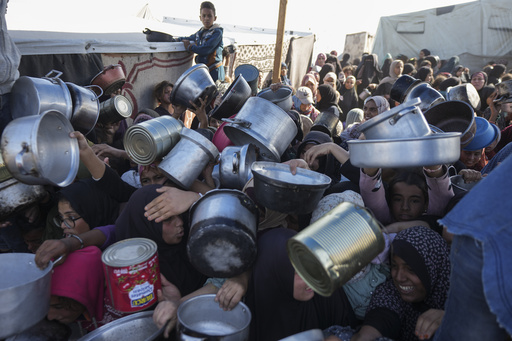
WASHINGTON — This week, a leading global organization that tracks food crises decided to retract a warning about an impending famine in northern Gaza, which it described as a result of Israel’s “near-total blockade.” This decision came after a request from the United States, following public reprimands of the report by the U.S. ambassador to Israel.
The public disagreement from the Biden administration regarding the findings of the U.S.-funded Famine Early Warning System (FEWS) has raised eyebrows among human rights advocates and aid officials, who are suggesting this may be an instance of U.S. political interference. The implications of declaring a famine could serve as a significant critique of Israel, which contends that its ongoing military operations in Gaza primarily target Hamas, rather than its civilian populace.
Earlier this week, U.S. Ambassador to Israel Jacob Lew labelled the report by FEWS as misleading and “irresponsible.” Both Lew and the U.S. Agency for International Development (USAID), which provides funding to FEWS, indicated that the report did not accurately reflect the rapidly evolving conditions on the ground in north Gaza.
No comments were made by the U.S. Embassy in Israel or the State Department. On Thursday, FEWS announced it had withdrawn its famine warning, with an intention to issue a revised report in January that will include updated data and insights. The organization opted not to provide any additional comments.
Ambassador Lew emphasized that the U.S. is collaborating extensively with the United Nations and Israeli authorities to address the significant humanitarian needs in the region, asserting that reliance on inaccurate data could be detrimental.
USAID confirmed it had requested the monitoring organization to retract its heightened alarm regarding imminent famine conditions following a report released on Monday. This dispute underscores the complexities of assessing hunger in the largely confined northern Gaza, where conditions have worsened due to intensified military operations and a drastic reduction in aid deliveries. Reports indicate that only a handful of trucks carrying food and water have crossed into the area since about October.
In its retracted report, FEWS indicated that unless there was a shift in Israel’s policies, it anticipated the number of deaths from starvation and related issues could rise to between two and 15 per day from January to March. The recognized standard for famine conditions is two or more deaths daily per 10,000 people.
Established by the U.S. development agency in the 1980s, FEWS is still funded by USAID but designed to deliver independent and neutral assessments of hunger crises, including those in conflict zones. Its findings are crucial for determining aid policies by the U.S. and other nations globally.
Israel’s Foreign Ministry spokesperson Oren Marmorstein welcomed Ambassador Lew’s counter to the famine alert, stating, “FEWS NET – Stop spreading these lies!” However, some aid activists view the ambassador’s public critique as an attempt to politically influence the independent agency’s work. Scott Paul, from Oxfam America, remarked that the ambassador’s actions seem to jeopardize the integrity of the expert assessments that FEWS was created to provide.
Kenneth Roth, a former executive director of Human Rights Watch, argued that the situation reflects the potential for U.S. political interests, particularly concerning support for Israel, to interfere with the essential work of independent organizations.
Israel maintains that its military focus in northern Gaza targets Hamas militants, claiming that most residents have evacuated to Gaza City, where aid is most commonly delivered. However, accusations of ethnic cleansing have surfaced from critics, including a former defense minister, regarding Israel’s actions in the northern region.
The northern Gaza area has faced severe impacts from the ongoing conflict and restrictions on aid throughout the duration of the war. Global observers and officials from both the U.N. and U.S. have consistently raised alarms about the risk of severe malnutrition and starvation.
International representatives have indicated that Israel, under pressure from the U.S., initially increased the volume of aid entering the region last summer. However, the U.S. and U.N. estimate that daily, 350 to 500 trucks of food and essential supplies are required for the population. In recent times, however, reports indicate that Israel has once again placed severe constraints on aid delivery.
Cindy McCain, the U.S. head of the U.N. World Food Program, has called for political interventions to facilitate food aid delivery to the Palestinian population. Israel maintains it imposes no limitations on aid entering Gaza, alleging that numerous truckloads remain untapped at its crossing points. In contrast, U.N. agencies argue that rampant military activity and Israeli-imposed restrictions make efficient aid distribution unfeasible.
Ambassador Lew stated the famine warning relied on “outdated and inaccurate” information, highlighting uncertainties regarding the number of residents remaining in northern Gaza amid recent evacuations. FEWS, however, maintained its findings were relevant even with a reduced population of as few as 10,000 individuals.
USAID acknowledged it had previously reviewed the report before its public release and cited discrepancies in population estimates and other key data. They requested the monitoring agency address these concerns before publication, emphasizing the need for clarity and accuracy.
Roth criticized the American response to the agency’s report, particularly given the severe humanitarian crisis. He contended that debates surrounding population figures served to distract from the reality that the Israeli government is significantly impeding food access.
As the primary supporter of Israel, the U.S. has provided substantial military aid during this conflict, while the Biden administration has continuously pushed for increased aid access in Gaza, warning that the lack of delivery could lead to restrictions on military funding. Recently, the administration acknowledged improvements on the ground without following through on restrictions.
The political climate surrounding military support for Israel in the U.S. remains contentious, especially with hard-line opinions emerging both for and against enhancing support amid growing concerns about the well-being of Palestinian civilians. The Biden administration’s cautious approach in advocating for better conditions has led to diminished backing among Democrats during previous electoral contests.

